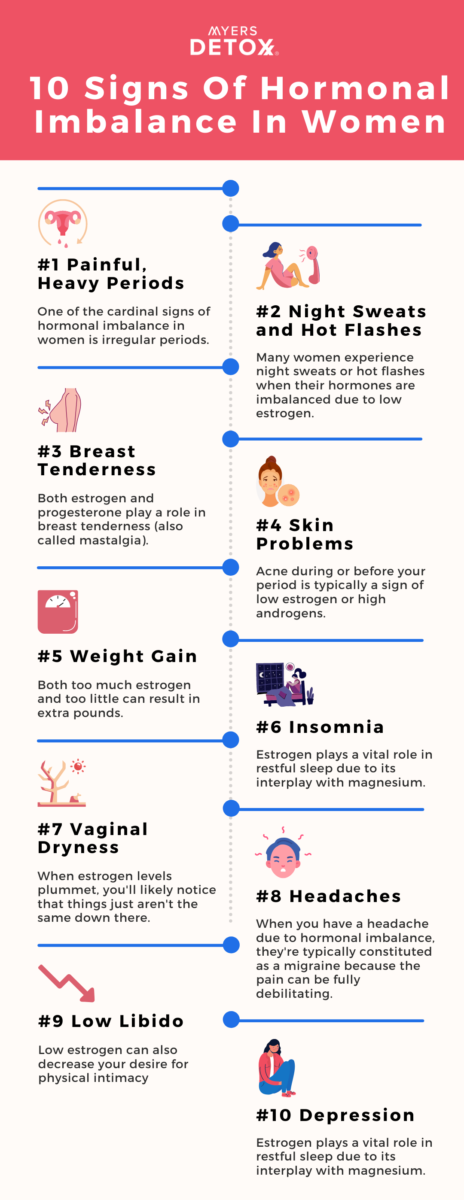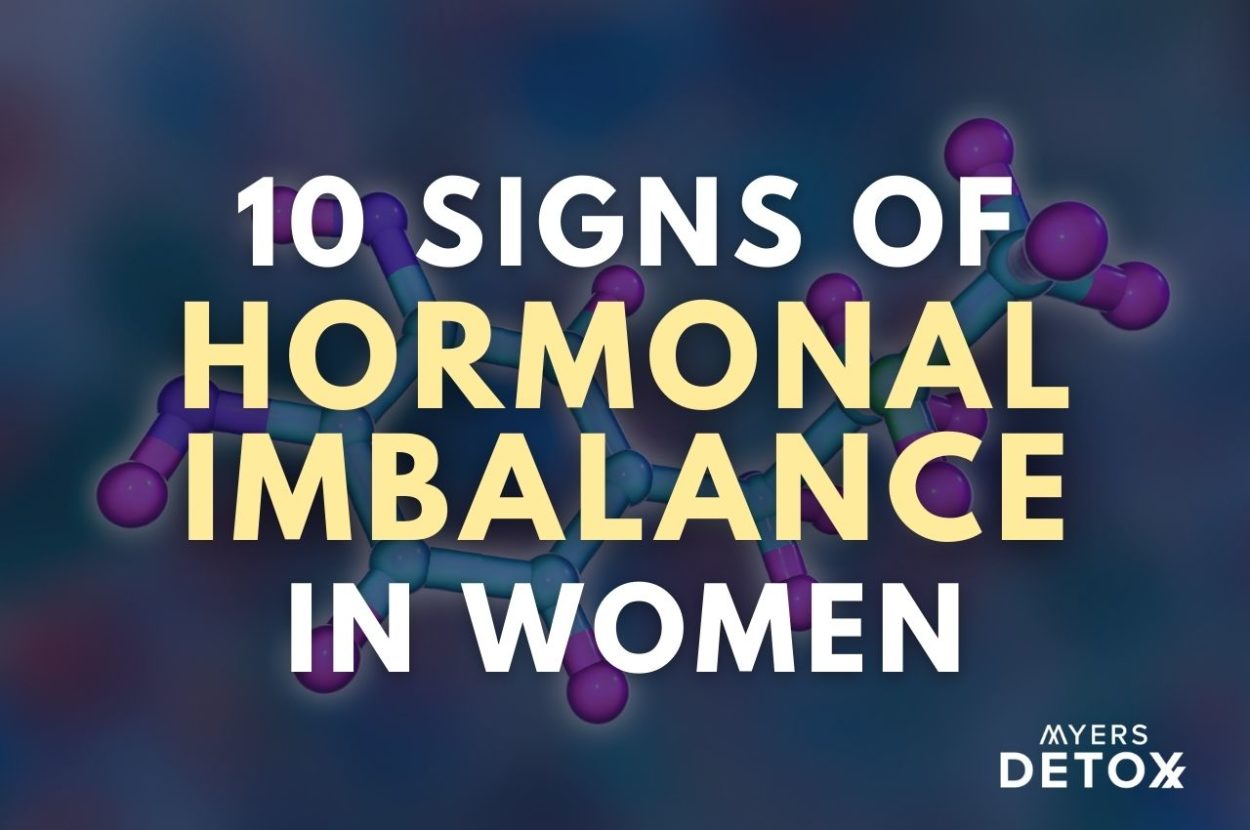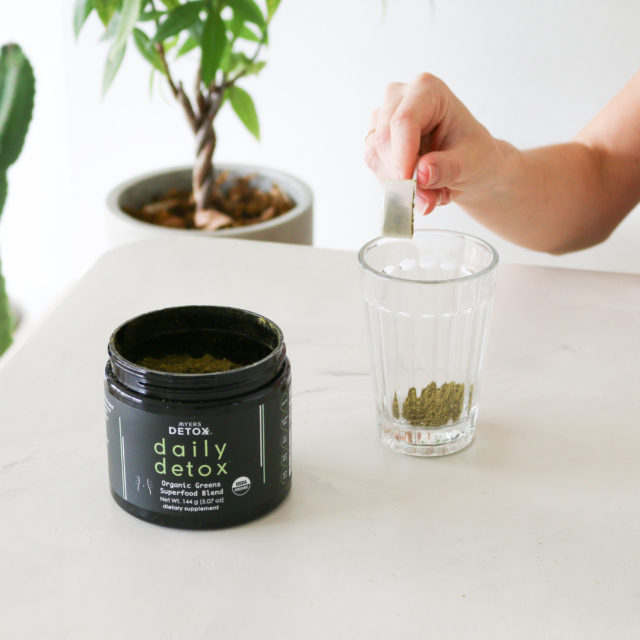How do you know if your hormones are working for you or against you? And what signs should you be aware of?
So many women are suffering from hormonal imbalance these days that the symptoms are no longer looked at as warning signs but rather just everyday inconveniences of having a female body. It’s estimated that nearly 80% of women have some sort of hormonal imbalance, and most are not even aware of it[1].
In this article, you’ll learn:
- Why sex hormone imbalance can disrupt your entire system
- 10 crucial signs of hormone imbalance to be aware of
- Why hormone imbalance has become so prevalent
- The most important thing that women need to do to protect their bodies from hormone imbalances
Meet Your Hormones
While the focus of this article is on female sex hormone imbalances, it’s crucial to understand that absolutely nothing in your body happens in a vacuum. This is especially true when it comes to your hormonal system.
For instance, the two sex hormones estrogen and progesterone are so tightly integrated that symptoms can look the same whether one is too high or the other is too low. Estrogen and progesterone work together in an intricate dance to create your menstrual cycle, support fertility and reproduction, and produce breast milk to feed your newborns. Without the appropriate levels of each, your flow will quickly become irregular, fertility will diminish, and your body will slow down its ability to reproduce[2].
In an interplay between hormonal systems, your thyroid and adrenals may also take hits when your sex hormones are off. In something referred to as the OAT axis (Ovarian-Adrenal-Thyroid), when one system of hormones goes out of balance, the other two systems are called upon to pick up the slack. This is why you often see imbalances like thyroid issues and sex hormone dysfunction happening together.
Your thyroid produces hormones that are crucial for energy production, metabolism, digestion, muscle and brain function, and the maintenance of your bone structure[3]. Meanwhile, your adrenal glands secrete hormones that regulate immunity, metabolism, stress response, blood pressure, and more[4].
So, how do you know if you have an imbalance in one, two, or all three of these systems? Looking at your symptoms is the first step. Below are the ten most common signs of hormonal imbalance in women.
10 Signs Of Hormonal Balance In Women

#1 Painful, Heavy Periods
One of the cardinal signs of hormonal imbalance in women is irregular periods. While late, long, short, or non-existent periods can result from a multitude of factors, heavy and painful periods are almost always due to excess estrogen or low progesterone.
As previously mentioned, estrogen and progesterone work together to create your menstrual cycle. When estrogen is high, it thickens your uterine lining, and when it breaks down during your menstrual cycle, it signals the release of prostaglandins, which are responsible for inflammation and pain[5][6].
#2 Night Sweats and Hot Flashes
Night sweats occur when your blood vessels expand, which causes increased blood flow and then contract –causing a sudden wave of heat to spread through your body.
Many women experience night sweats or hot flashes when their hormones are imbalanced due to low estrogen. Estrogen, in part, regulates the body’s temperature. While the most common group to complain of night sweats in women going through menopause (a time when your estrogen levels naturally decline), many younger women experience night sweats when their estrogen is low as well, for instance, after they’ve had a baby [7].
Night sweats can be anywhere from mildly irritating to seriously disruptive of your sleep. When they get really bad, you may wake up completely drenched in your own sweat and needing to change your pajamas and maybe even your sheets.
#3 Breast Tenderness
Both estrogen and progesterone play a role in breast tenderness (also called mastalgia). While estrogen may cause your breast ducts to enlarge, progesterone causes your milk glands to swell — both of which can lead to breast tenderness.
Typically, breast tenderness is due to excess estrogen and/or decreased progesterone levels. The relationship between these two hormones comes in again here as it is more to do with the ratio of estrogen and progesterone concerning breast tenderness than the exact levels of each[8].
#4 Skin Problems
Many women complain of skin problems before and during their menstrual cycle. While you may have perfectly smooth and clear skin for three weeks out of the month, that one week of menstruation can look a whole lot different.
Acne during or before your period is typically a sign of low estrogen or high androgens. Androgens, which are thought of as male sex hormones, play a vital role in the balance of a women’s hormonal system as well — albeit a much smaller role than for men.
When out of balance, androgens can trigger your body to produce sebum and encourage the migration of bacteria to your hair follicles; these two events result in pimples and unwanted acne[9].
#5 Weight Gain
Estrogen is typically the hormone to blame when you’re experiencing unwanted weight gain. The problem is, both too much estrogen and too little can result in extra pounds. Too much estrogen is associated with visceral weight gain (abdominal fat), while too little estrogen can slow down your metabolism and has been indicated in the progression of metabolic syndrome[10][11].
But hormone balance and weight aren’t as simple as pinning the blame on estrogen. Since everything in your body is related, you also have to consider how hormonal imbalance may impact other areas of your body.
Thyroid hormone, for instance, is a crucial component of your metabolism. Research shows that when your thyroid hormone is low, it will lower your basal metabolic rate (BMR), which is the amount of energy you burn while at rest. Your BMR plays a huge role in weight maintenance as it’s your body’s setpoint for energy expenditure. When your BMR is shifted, weight gain is almost always the first thing you’ll notice[12].
Therefore, weight gain may be due to an estrogen balance alone, or it could be other factors playing into your hormonal system that is pushing your thyroid hormones off balance.
#6 Insomnia
Estrogen plays a vital role in restful sleep due to its interplay with magnesium. You’ve likely heard that taking magnesium before bed can result in a better night’s sleep. Well, that may be true, but if estrogen isn’t on board, you can take all the magnesium you want, and you’ll likely keep tossing and turning without reprieve.
Why? Because estrogen helps to move magnesium into your tissues, which is an essential step in the production of the sleep hormone melatonin. When melatonin is low, it can feel like the signal to “shut down” your brain is broken, and the result is endless thoughts and worries and a body that won’t relax.
This is why many women entering menopause have trouble falling asleep and staying asleep at night; the estrogen levels in their body are declining and producing downstream effects on sleep[13].
#7 Vaginal Dryness
Estrogen is the hormone in your body that keeps things luscious, moist, thick, and healthy. This is why when we think of a fertile woman, she always has child-bearing hips, supple skin, and a glow that tells you she is full of life and energy. All of these characteristics come from healthy levels of estrogen.
When estrogen is low, however, things tend to dry up and look and feel less luscious. This also goes for your vagina.
Vaginal dryness can show up as pain during intercourse, loss of moisture, or more fragile vaginal tissue. Since estrogen is responsible for the moisture, thickness, and elasticity of the skin in your vaginal area, when estrogen levels plummet, you’ll likely notice that things just aren’t the same down there[14].
#8 Headaches
Hormonal headaches aren’t your run-of-the-mill, take an aspirin and get over it headache. When you have a headache due to hormonal imbalance, they’re typically constituted as a migraine because the pain can be fully debilitating. For some women, getting off the sofa and making themselves a cup of tea is too much to ask when they’re having a migraine flare-up.
Many women report headaches right before their period, as this is a time when estrogen levels plummet. However, progesterone may also play a role in the onset of hormonal headaches. Both estrogen and progesterone affect migraine-related chemicals in your brain, which is why hormonal balance, in general, can be a causative factor[15][16].
#9 Low Libido
Having a strong libido is a clear indicator of fertility — and it makes sense, doesn’t it? If your body is ready for childbirth, your desire for intercourse would likely be strong, and vice versa. Sadly, studies show that around 33% of American women have a low sex drive.
Along with vaginal dryness, which can turn you off to sex all on its own, it appears that low estrogen can also decrease your desire for physical intimacy[17].
Once again, if you think of estrogen as a hormone that primes your body for fertility, it checks out that your sex drive would also take the back-burner when estrogen is low.
Low testosterone are also clearly a factor in low sex drive as well.
#10 Depression
Much like weight gain, several factors and systems in your body may contribute to feelings of depression.
From a hormonal perspective, it’s been noted that women are twice as likely to suffer from depression as men, and it’s believed that estrogen plays a role. While the exact mechanism is not clear, it’s well-understood that estrogen interacts with the neurotransmitter serotonin and influences its activity in your body. Therefore, when estrogen is out of balance, it can directly impact the production of serotonin, which is a crucial component of mood regulation[18][19][20].
Furthermore, when looking at your hormonal system from a holistic view, if one hormone is off, it will cause a cascade of hormonal imbalances. One of the immediate systems that sex hormones can impact is your adrenal hormones. Cortisol, which is tied to your adrenal system, can create feelings of stress, anxiety, and depression[21][22].
Why Do Hormones Become Unbalanced?
While there are several factors that may impact the balance of your hormones, by far, the most common is the presence of something called endocrine disruptors in our environment.
Endocrine disruptors are chemicals that either mimic or interfere with the function of your hormonal system (also called your endocrine system). These chemicals are linked to a wide range of health issues, inducing developmental, reproductive, immune, and neurological.
Where are these endocrine disruptors hiding? Pretty much everywhere.
You can find dangerous endocrine-disturbing chemicals in your personal care products, fruits, and vegetables (due to pesticides), detergents, flame-retardants used on your furniture, plastic bottles, toys, cosmetics, and more. Some examples include[23]:
- Bisphenol A (BPA)
- Dioxins
- Perchlorate
- Perfluoroalkyl and Polyfluoroalkyl Substances (PFAS)
- Phthalates
- Phytoestrogens
- Polybrominated diphenyl ethers (PBDE)
- Polychlorinated biphenyls (PCB)
- Triclosan
Although your body is incredibly reliant in many ways, your hormonal system is a tightly regulated and delicate machine. This makes compounds like those mentioned above all the more dangerous, as even in small doses, they can create a lot of dysfunction.
When absorbed by your body, either through food, water, or skin contact, these chemicals can either increase or decrease levels of hormones, mimic the function of your hormones, or alter the natural production of hormones[24].
How To Combat Endocrine Disturbers And Protect Your Hormones
Clearly, the best way to combat the impact of endocrine-disturbing chemicals is to avoid them altogether. This means choosing foods that are organic and non-GMO to ensure that they aren’t riddled with pesticides. Also, ensuring that your water supply is clean and free of chemical contaminants. And of course, choosing household and beauty products that are natural and clean.
However, as mentioned previously, these chemicals are everywhere in our environment. This means that even if you’ve done all your due diligence of keeping your exposure low, there is still a very good chance you’ll come into contact with these harmful chemicals in one way or another.
Even if you control everything possible in your environment to reduce toxin exposure, you still get exposed. Toxins are impossible to avoid.
The solution? Support your body’s ability to detoxify them.
Your liver is your body’s first line of defense against chemical invaders of all kinds. Naturally, when your body detects endocrine disturbers in your system, its first call to action is to try to eliminate them through detoxification. While this is a useful and essential role that your liver plays in protecting you against toxic assaults, it can also put a significant amount of pressure on this crucial organ.
In fact, detoxifying harmful chemicals like endocrine disturbers can put your liver at risk for diseases like non-alcoholic fatty liver disease (NAFLD)[25].
Therefore, if you want to support your body’s detoxification of endocrine disruptors without over-taxing your liver, you must supply your body with the nutrients it needs to optimize the detox process while protecting this hard-working organ.
I created my supplement Daily Detox precisely for this purpose. Daily Detox combines foods and herbs that are specifically meant to target detoxification and support the health of your liver. It includes an antioxidant blend, a liver-supportive blend, metabolic support, and nutrients that help your body optimize all phases of detox.
Endocrine disruptors are, unfortunately, a part of our daily lives. As I mentioned, you can do your best to steer clear of these dangerous chemicals, but even with the most heroic efforts, you will still come into contact with endocrine disruptors. I spend my life studying detoxification and walking the walk with my daily practices, and I still find that I need to give my liver some extra love and support.
Daily Detox is what I take to give me the peace of mind that I need to live in a modern world and know I’m still caring for my body.
Takeaway
Hormone imbalances are more rampant today than ever before. And unfortunately, it doesn’t look like things are getting any better.
Endocrine disruptors come in to create havoc on your hormonal system, either mimicking hormones or altering their function. And to make matters worse, they’re practically unavoidable.
To protect the health of your hormonal system, the number one thing you can do to combat endocrine-disrupting chemicals is to support your body’s detoxification processes. A daily practice of strengthening liver health will assist your body in removing these compounds and give your hormonal system the ability to operate optimally.











